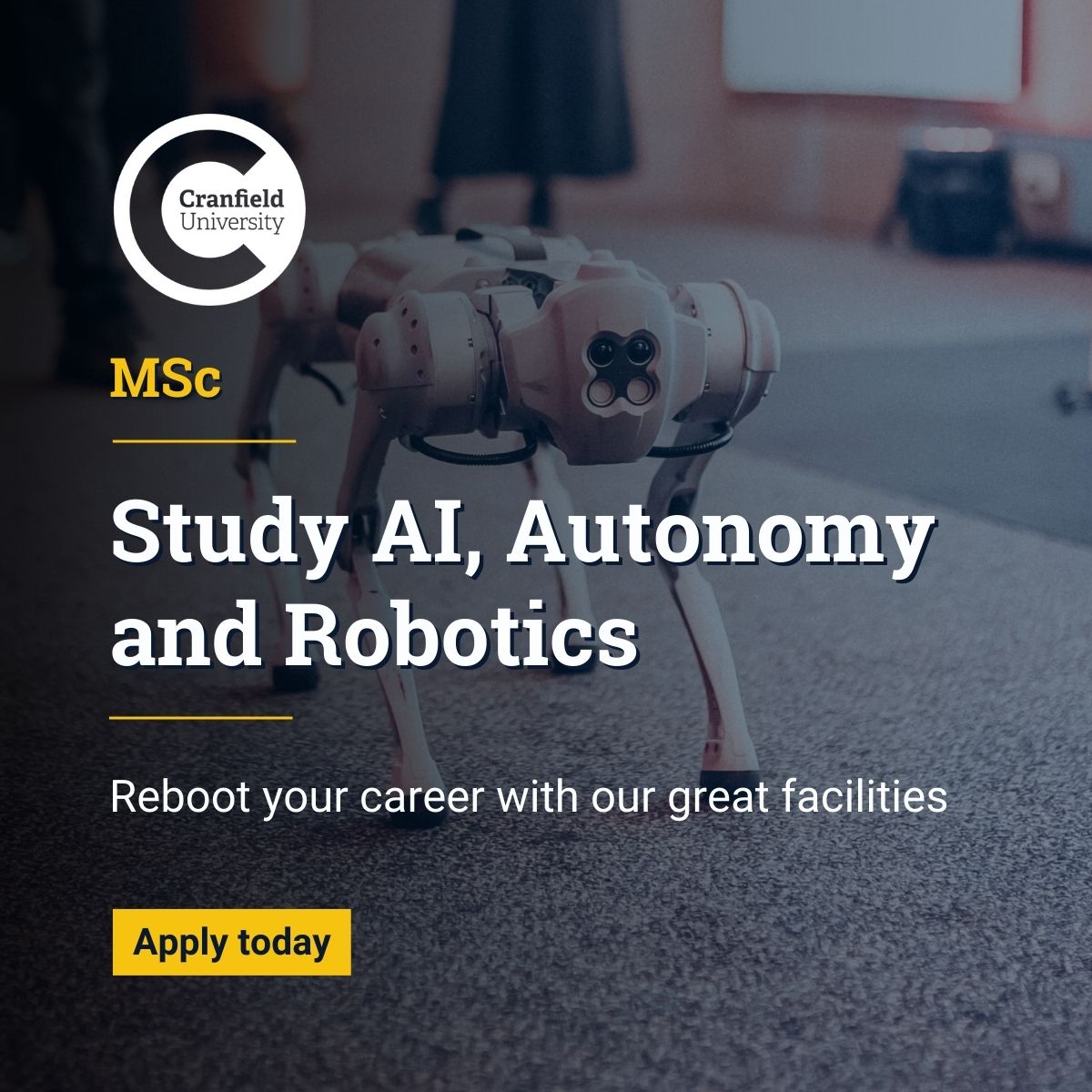From classroom to real-world robotics: My experience at Cranfield University
14/01/2025

Hi there! I’m Sakshi Chavan, and I’m thrilled to share my experiences as a recent graduate of the MSc in Robotics at Cranfield University. I graduated in 2024 and am currently residing in the United Kingdom, eagerly pursuing opportunities in the dynamic world of robotics and automation.
Why Cranfield? Why robotics?
Choosing Cranfield University for my master’s degree was a decision driven by several factors. Cranfield’s stellar reputation as a research-intensive institution with strong industry ties was a major draw. Robotics is a rapidly evolving field, and Cranfield’s unique approach of blending advanced theory with practical, real-world experience truly resonated with me.
The MSc in Robotics perfectly aligned with my passion for automation, artificial intelligence, and machine learning. The university’s emphasis on practical application and industry collaboration felt like the ideal environment to hone my skills and knowledge.
Furthermore, Cranfield’s commitment to supporting innovative projects and research, coupled with access to state-of-the-art facilities like the Aerospace Integration Research Centre (AIRC) and the Intelligent Mobility Engineering Centre (IMEC), solidified my choice. I knew this was the place where I could truly thrive and deepen my understanding of robotics.
A deep dive into the course
The MSc in Robotics at Cranfield is both intellectually stimulating and technically demanding, in the best way possible. The curriculum is structured to provide a solid foundation in core robotics principles, while also exploring advanced topics like machine learning, autonomous systems, and human-robot interaction. Key modules such as Fundamentals of Robotics, Forward and Inverse Kinematics, Artificial Intelligence and Machine Learning, and Programming Methods for Robotics provide a robust theoretical framework. The hands-on labs and projects then allow you to translate these concepts into practical solutions for real-world robotics challenges.
One of the highlights of the course was our group project in collaboration with SWIFT robotics company. We worked on developing a dynamic obstacle avoidance solution for mobile robots, focusing on navigation and path planning in dynamic indoor environments. This was a highly relevant, industry-focused problem. Working directly with an external company provided invaluable real-world insights into the challenges faced by the industry. Seeing our system evolve through iterative feedback and testing in various dynamic scenarios was incredibly rewarding.
Life at Cranfield
A typical day at Cranfield was a balanced mix of lectures, lab work, self-study, and social activities. My days usually began with lectures, running from 9am to 5pm, depending on the schedule. Mornings were typically dedicated to theoretical concepts in modules like Artificial Intelligence or Robotics Kinematics, while afternoons often involved hands-on lab sessions. These labs were a personal highlight, allowing me to apply the morning’s lectures to tangible problems.
Longer lab sessions were particularly exciting, providing opportunities to experiment with various robotics systems, from building machine vision applications to fine-tuning path planning algorithms for autonomous robots. The practical nature of these sessions truly solidified the theoretical knowledge gained in the classroom.
After a full day of academics, my friends and I would often head to the sports hall for a game of badminton or a walk along the campus woodland trail. It was a great way to de-stress and stay active. The sports facilities at Cranfield are fantastic not only for unwinding but also for connecting with classmates from all over the world.
Evenings were often spent working on assignments together. These collaborative study sessions were incredibly productive, allowing us to bounce ideas off each other, especially when working on group projects. These sessions sometimes stretched late into the night, especially near deadlines, but working as a team made the workload much more manageable and enjoyable. We shared insights, troubleshot code, and supported each other through the challenges of the course.
The present and the future
Currently, I’m working part-time as a retail associate while actively applying for technical roles in the robotics and automation sectors. While not directly related to my field, this role has surprisingly helped me develop valuable interpersonal and communication skills.
My primary focus remains on securing a position where I can apply the knowledge and technical expertise I gained at Cranfield. I’m particularly drawn to roles involving autonomous systems, machine learning, and robotic navigation. While my current job provides practical experience in customer interaction, I’m eager to return to a more technical environment where I can tackle the cutting-edge challenges in robotics that inspired me during my studies.
Studying in the UK, and at Cranfield in particular, has been an incredible experience. The diverse cultures, academic rigour, and exposure to industry standards were all enriching. Cranfield’s postgraduate focus creates a mature environment where everyone is deeply invested in their field. The university’s close ties with industry ensure that classroom learning is directly applicable to real-world scenarios. The emphasis on research and the opportunity to work on live industry projects made me feel like I was making a real contribution to the field, even as a student. The quiet, rural setting of the university also provided a welcome contrast to the busy academic schedule, offering time for reflection, study, and enjoying the natural surroundings.
My future aspirations are fuelled by a deep passion for exploring the endless possibilities of robotics. I’m excited to push the boundaries of what robots can achieve, whether it’s advancing autonomous systems, developing intelligent machines, or creating innovative solutions that can transform industries. My immediate goal is to work in the robotics and automation sector, focusing on developing systems that can operate autonomously in unpredictable environments. I’m also keen to explore how artificial intelligence can further enhance robotic systems, particularly in industrial settings. In the long term, I aspire to take on leadership roles in robotics development, working at the forefront of innovation in automation technology. I even plan to pursue a PhD to delve deeper into cutting-edge research and contribute to the next breakthroughs in robotic intelligence.
Advice for aspiring roboticists
For anyone interested in a career in robotics, I advise you to stay curious, patient, and adaptable. Robotics is a diverse and interdisciplinary field, blending mechanics, electronics, computer science, and artificial intelligence. Build a strong foundation in these areas, but don’t hesitate to specialise in topics that truly interest you.
Master the fundamentals – mathematics, programming, and control systems are key. Hands-on experience is equally important, so get involved in projects, internships, and competitions early on. Remember that robotics is constantly evolving, and continuous learning is crucial.
Networking is equally important. Join robotics clubs, attend conferences, and connect with professionals and researchers.
Finally, don’t shy away from challenges. Robotics often involves complex problems, but perseverance and a willingness to learn from failures is what defines successful roboticists.
More about me
Beyond my academic pursuits, I have a passion for travel. I believe it broadens perspectives and offers new ways of seeing the world. For me, it’s about immersing myself in different cultures, learning how people live and interact with technology, and drawing inspiration from those experiences. Traveling can spark fresh ideas and approaches to my work in robotics. Meeting innovators from around the globe, observing how different societies embrace technology, and understanding diverse needs can fuel new solutions for global challenges in automation. I see travel as both a personal passion and a professional advantage, each journey shaping my approach to my work and my vision for the future of robotics.
Categories & Tags:
Leave a comment on this post:
You might also like…
Setting up a shared group folder in a reference manager
Many of our students are now busy working on their group projects. One easy way to share references amongst a group is to set up group folders in a reference manager like Mendeley or Zotero. ...
Company codes – CUSIP, SEDOL, ISIN…. What do they mean and how can you use them in our Library resources?
As you use our many finance resources, you will probably notice unique company identifiers which may be codes or symbols. It is worth spending some time getting to know what these are and which resources ...
Supporting careers in defence through specialist education
As a materials engineer by background, I have always been drawn to fields where technical expertise directly shapes real‑world outcomes. Few sectors exemplify this better than defence. Engineering careers in defence sit at the ...
What being a woman in STEM means to me
STEM is both a way of thinking and a practical toolkit. It sharpens reasoning and equips us to turn ideas into solutions with measurable impact. For me, STEM has never been only about acquiring ...
A woman’s experience in environmental science within defence
When I stepped into the gates of the Defence Academy it was the 30th September 2019. I did not know at the time that this would be the beginning of a long journey as ...
Working on your group project? We can help!
When undertaking a group project, typically you'll need to investigate a topic, decide on a methodology for your investigation, gather and collate information and data, share your findings with each other, and then formally report ...









